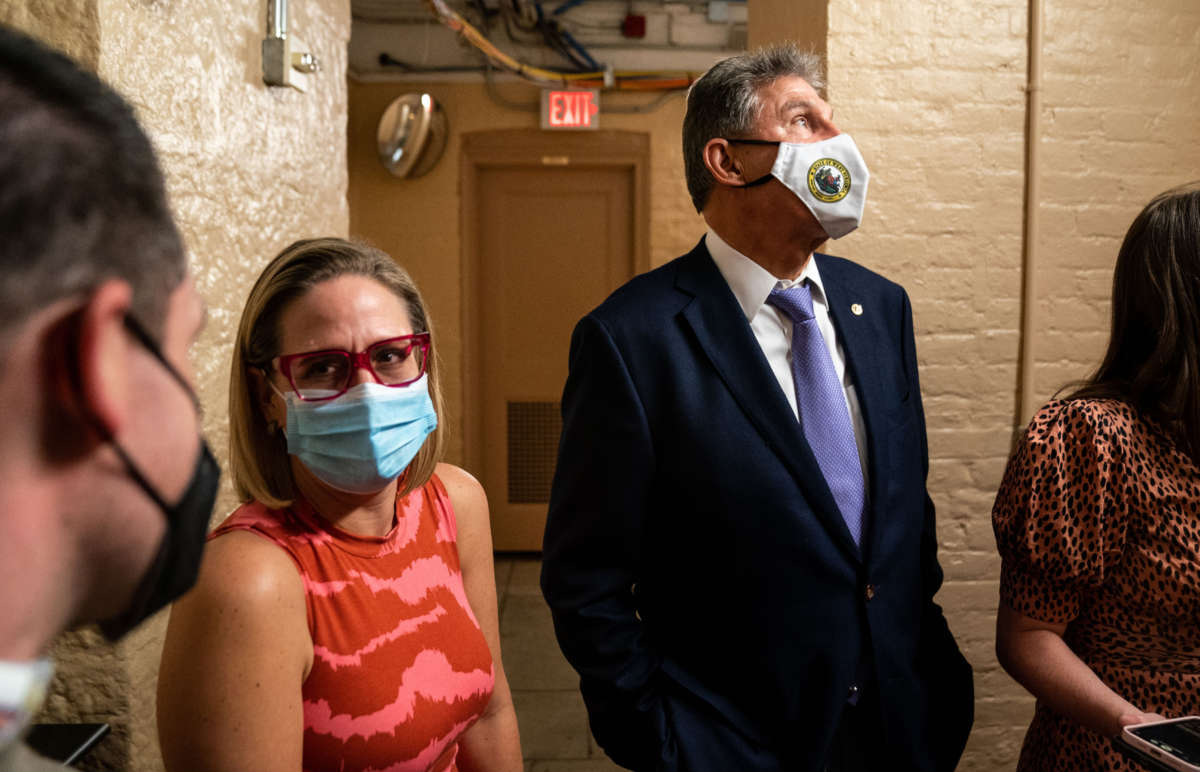After months of negotiations, Democratic leaders are signalling that the topline of the Build Back Better Act will have to come down — an outcome that conservative Democrats like Senators Kyrsten Sinema of Arizona and Joe Manchin of West Virginia have relentlessly campaigned for. But Democrats now face a challenge: They can’t figure out what Sinema and Manchin want.
Sinema has been particularly opaque, stonewalling her colleagues about her wish list for the reconciliation bill and only sharing details with the White House, per Politico. “I’m not going to share with you or with [Senate Majority Leader Sen. Chuck] Schumer or with [House Speaker Nancy] Pelosi,” she reportedly told a fellow Democratic senator.
“I have already told the White House what I am willing to do and what I’m not willing to do. I’m not mysterious. It’s not that I can’t make up my mind. I communicated it to them in detail. They just don’t like what they’re hearing,” she continued.
But despite Sinema’s insistence that she has been transparent, she has concealed nearly all of her demands from both Congress and the public.
Sinema’s stance against allowing Medicare to negotiate prescription drug prices is particularly concerning, as the measure is a key provision of the bill that Democrats are relying on to raise revenue. Though the proposal has the potential to save the government $800 billion, it’s unlikely that Democrats would be able to convince Sinema to support a drug pricing reform plan that would raise even $200 billion, according to Politico.
While Manchin has shared more of his demands with his colleagues, he too has been vague and indecisive. Last week, reporters uncovered a memo that he sent back in July about wanting to cut the bill, but it offered little detail other than a topline of $1.5 trillion over ten years — a $2 trillion cut — and a call for “no additional handouts.”
On the latter point, Manchin has been clear: he doesn’t want the U.S. to become a so-called “entitlement society,” as he told the press last week. On Wednesday, Politico reported that Manchin has rejected a proposal to subsidize coal workers’ incomes to help them transition into other fields. The West Virginia senator disparaged the measure as “welfare.”
Progressives like Sen. Bernie Sanders (I-Vermont) have taken umbrage with Manchin’s welfare-related comments. Last week, Sanders hosted a short press conference to condemn Manchin for implying that allowing seniors to access vision, dental and hearing care are “entitlements,” and bad for American society at large. Sanders also noted that it’s “long overdue” for Manchin to say “with specificity” what he wants for the bill.
Part of the problem appears to be that Manchin and Sinema can’t agree what should be cut — an especially challenging obstacle when most of the Democratic caucus don’t want to cut anything from the bill, according to progressive lawmakers. Though Sinema is opposed to the massively popular drug pricing reform plan, Manchin is in favor of it — with his own caveats.
Manchin has been insistent on including his own plan to tax prescription opioids, which would likely end up harming patients who need the drugs. Sinema’s allies at the massive pharmaceutical lobbyist group PhRMA oppose both Manchin’s plan and the prescription drug pricing plan.
While Sinema is reportedly in favor of carbon pollution pricing programs, Manchin is opposed to them.
“Manchin and Sinema want very different things, both in terms of revenue and programs,” a source close to the White House told Politico.
The discrepancies between Manchin and Sinema seem to reflect which lobbyists they have benefited from the most. Sinema, who is allied with Big Pharma, has received $750,000 from the pharmaceutical and medical devices industry throughout her political career. Manchin, on the other hand, has close ties to Exxon, whose lobbyists have bragged about their regular access to him.
Progressive groups and lawmakers have slammed the conservative Democrats for their attempts to force the party to choose between social programs. Though progressives are fighting to keep the entire $3.5 trillion bill, in the likely case that the topline has to come down, they’d rather shorten the timeline for the proposals than have to cut any of them from the bill altogether.
On Tuesday, Sanders emphasized that he views the proposal to expand Medicare as “not negotiable,” saying, “I do understand that the healthcare industry does not like this idea, but maybe, just maybe, we stand with the American people.”
Join us in defending the truth before it’s too late
The future of independent journalism is uncertain, and the consequences of losing it are too grave to ignore. To ensure Truthout remains safe, strong, and free, we need to raise $27,000 in the next 24 hours. Every dollar raised goes directly toward the costs of producing news you can trust.
Please give what you can — because by supporting us with a tax-deductible donation, you’re not just preserving a source of news, you’re helping to safeguard what’s left of our democracy.
